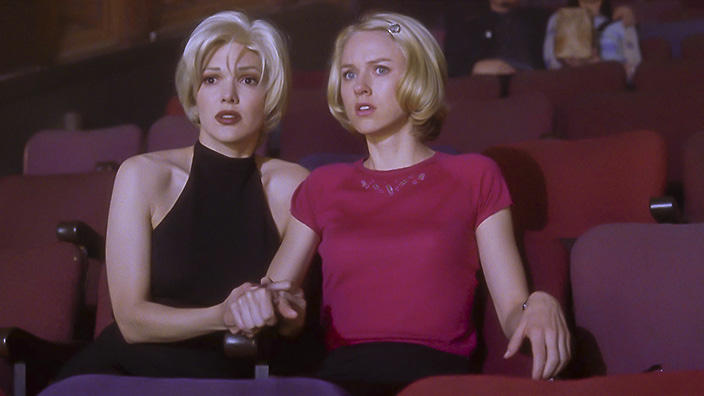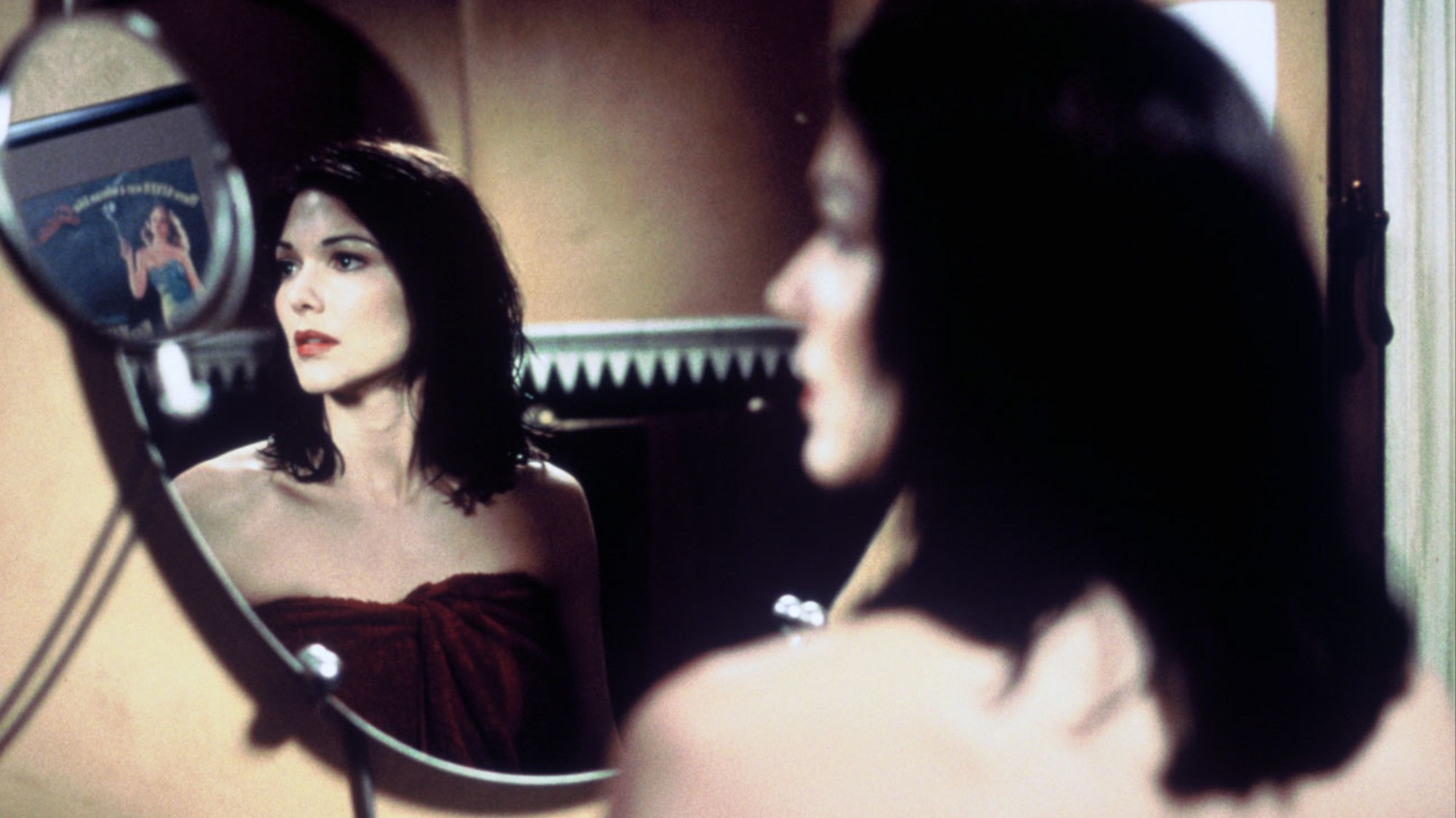- Director: David Lynch
- Writer: David Lynch
- Starring: Naomi Watts, Laura Elena Harring, Justin Theroux, Ann Miller, Robert Forster, Mark Pellegrino, Dan Hedaya, Angelo Badalamenti, Monty Montgomery, Lee Grant, Rebekah Del Rio, Melissa George, and Billy Ray Cyrus
- Accolades: 2012 Sight & Sound Top 100 list (#28), 2008 Cahiers du Cinema Top 100 list (#94), 2019 BBC Top 100 21st Century Films (#1), shown at 2001 Cannes Film Festival, 1 Oscar nomination (Best Director – David Lynch)
- Where to Watch: Buy or rent on Amazon Video, YouTube, or Apple TV
Mulholland Drive is certainly a serious candidate for the most critically acclaimed movie of its decade, and it is very, very weird, and usually I like very, very weird movies. Does that mean I like this movie? I don’t know? I think I was left with the feeling a “regular” viewer has when watching a kind of weird movie, which is, “I don’t feel like I’m getting this.” I did not feel like I “got” Mulholland Drive. That said, am I going to sit here and say it’s “overrated,” or something equally trite? No. It is more that writer/director David Lynch does not make things for everyone, and if it is your thing (as at least some of his work is my thing) then it is more your thing than anything ever, and if it isn’t your thing, it really, really isn’t. And now some readers are thinking, “I don’t feel like I’m getting this.”
The way to think about Mulholland Drive, probably, is less as a movie about a mystery than a movie that is a mystery. If you are expecting there to be an explanation or way in which the actions the characters are taking come together in the end, spoilers, there is nothing remotely like that. On the DVD release of this movie, David Lynch apparently included a “list of clues,” but I’m not even sure what I’m supposed to be solving here. What are they clues for? One popular theory among critics seems to hold that the first three fifths or so of the movie is a dream by the main character in the final two fifths or so of the movie. Let’s say that’s true then. Where does that get us?

Naomi Watts starts out the movie playing Betty, a wide-eyed aspiring actress who has just arrived in Hollywood. She arrives at her aunt’s apartment, where she is supposed to stay, to find that someone is already there. This is Rita (Laura Elena Harring), who is left an amnesiac after being the sole survivor of a car crash on the titular road. For people not familiar with LA, if you have seen those famous views from the hills looking down over the sparkling lights of the city, they were probably taken from the winding Mulholland Drive, named, by coincidence, for the LA Water Commissioner whose shady actions partly inspired the plot of Chinatown. Rather than kicking Rita out, the good-hearted Betty tries to help her figure out what’s going on with her. In the course of this the two women sleep with each other and seem to fall in love. Their investigation leads the two of them first to a bizarre nightclub and then to an apartment supposedly owned by Diane Selwyn, where they find someone who is not Diane who says they’ve switched apartments. When the ladies all investigate Diane’s new apartment, they find a dead body. A frightened Betty drops various items on the floor…
Then suddenly we are in a twisted version of a story that’s not that different, where Camilla (Harring) is a famous movie star and Diane (Watts) is her jilted lover (I think?). Diane attempts to hire a hitman (Mark Pellegrino) to kill Camilla (again, I think), is eventually terrorized by hallucinations, and runs to her bed (the one where they found the dead body before), where she shoots herself. Cut back to the crazy nightclub, where someone on stage just whispers, “Silencio.”

That is what you might call the primary throughline of Mulholland Drive, but I have thus far ignored the fact that there are a bunch of other things that happen that don’t seem to be connected to anything. Perhaps most prominent among these is the Hollywood director played by Justin Theroux, who comes in for a meeting with his producers one day to discover that his project has been taken over by some weirdos who I’m guessing are the mob (mostly because they’re Italian?), who insist that he casts an Actress named Camilla (Melissa George), i.e. the same name as Harring’s character in the final part of the movie, as his lead character. He also walks in on his wife (Lori Heuring) having sex with Billy Ray Cyrus (or at least a character played by Billy Ray Cyrus, I think), and the two of them proceed to get mad at him for finding out, basically. Then the director heads out to the desert to meet a mysterious cowboy (Monty Montgomery) who maybe runs the mob, and the two of them have a very long, weird conversation. Meanwhile, there’s a sequence in which a bumbling hitman (also Pellegrino) attempts to steal an address book and ends up killing three people in some crappy offices. Weirdest of all is a scene where one man in a suit (Patrick Fischler) describes a nightmare he’s had to another man (Michael Cooke), about a terrible creature lurking behind the dumpster at the Winkie’s Diner where the two of them are eating. They then go out back to try and prove the dream wrong, but there is in fact a very dirty homeless person matching the description from the dream, causing the first man to fall over and look like he’s having a heart attack.
The famous (in movie buff circles) origin story of Mulholland Drive is that it began life as a 90-minute TV pilot, which David Lynch intended as a follow-up to his cult success Twin Peaks but then found himself entirely unable to sell to anyone. Over a year after the pilot was shelved, French studio Studiocanal offered Lynch $7 million dollars to turn his open-ended pilot into a movie, and many of the same actors came back to shoot their new parts. Lynch added all of the later part of the movie after they find the body, as well as the romantic storyline between Betty and Rita in the first part. On the movie’s release, Roger Ebert immediately said it represented the “culmination of Lynch’s career” and Rolling Stone said it “made movies feel alive again.” But the acclaim was hardly universal, with some openly angry about the eventual “bait and switch” of the characters. The Washington Post reviewer was only slightly more charitable, calling the movie, “an extended mood opera… if you want to put a label on incoherence.” I do think, in retrospect, that if you are wondering if you should watch this movie on the basis that it ranks high on many lists voted on by critics, you should realize that it does so well on those lists, not because everyone voted for it, but because the people that do vote for it put it very high. That is to say, even among movie critics there is a substantial subset who scratch their heads at it.
I am not going to sit here and demand that David Lynch make sense. That is not the point of him. I don’t know anyone personally who is more appreciative of weirdness for the sake of weirdness than I am. But I do think that the weirdness does have to be in service of something, and I really have no idea what that is here. One article I found called the movie “a portrayal of the Hollywood Golden Dream turned rancid, curdling into a poisonous stew of hatred, envy, sleazy compromise and soul-killing failure.” Thematically, this works a lot better if that “Golden Dream” really means something to you in the first place, and maybe for me I’m not so emotionally attached to it that you can base a movie on that without having, you know, a plot that makes sense.


One thought on “MULHOLLAND DRIVE (2001)”